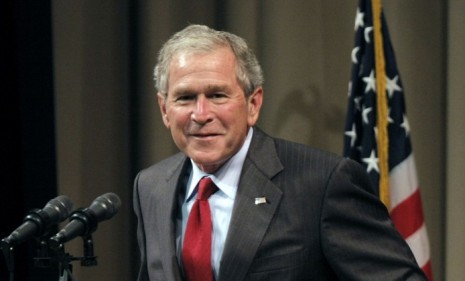'Ground Zero mosque': What would George W. Bush do?
Mosque supporters say the former president could ease tensions by reminding people we're not at war with Islam

A free daily email with the biggest news stories of the day – and the best features from TheWeek.com
You are now subscribed
Your newsletter sign-up was successful
Supporters of the "Ground Zero Mosque" are requesting help from an unexpected source — former president George W. Bush. Republican leaders, including Newt Gingrich and Sarah Palin, have called the project an affront to the memory of the victims. But Bush, says Ibrahim Hooper, the national spokesman for the Council on American-Islamic Relations (CAIR), was always careful to separate the acts of the terrorists from Islam as a whole, so "it would be good if he stepped into the fray." A spokesman says Bush won't weigh in on the mosque debate. But should he? (Watch Obama express "no regrets" over his mosque comments)
Yes, Bush should remind people we're not at war with Islam: Obama, with his "Clintonesque" support for religious freedom, and demagogues like Newt Gingrich apparently don't get that Islam isn't the enemy, says Maureen Dowd in The New York Times. Bush owes it to the nation to "add his anti-Islamophobia to this mosque madness."
The Week
Escape your echo chamber. Get the facts behind the news, plus analysis from multiple perspectives.

Sign up for The Week's Free Newsletters
From our morning news briefing to a weekly Good News Newsletter, get the best of The Week delivered directly to your inbox.
From our morning news briefing to a weekly Good News Newsletter, get the best of The Week delivered directly to your inbox.
Asking Bush to back the mosque is desperate, and hypocritical: It's nice that the left is giving its constant "Bush-bashing" a rest, says Byron York in the Washington Examiner. But this is clearly an act of desperation — the people begging for Bush's help now are the same ones who for years insisted he "had done grievous harm to America's image in the Muslim world."
"Mosque supporters beg George W. Bush to come to Obama's rescue"
Republicans should want to hear Bush's views more than anybody: After all, they're the ones dotting roadsides with "Miss Me Yet?" billboards, say the editors of the Anniston, Ala., Star. And conservatives really do "need a leader like Bush" these days, because Gingrich, Palin, and the rest seem more interested in exploiting religious intolerance and "far-right anger," instead of keeping it "deep in the basement" the way Bush did.
A free daily email with the biggest news stories of the day – and the best features from TheWeek.com